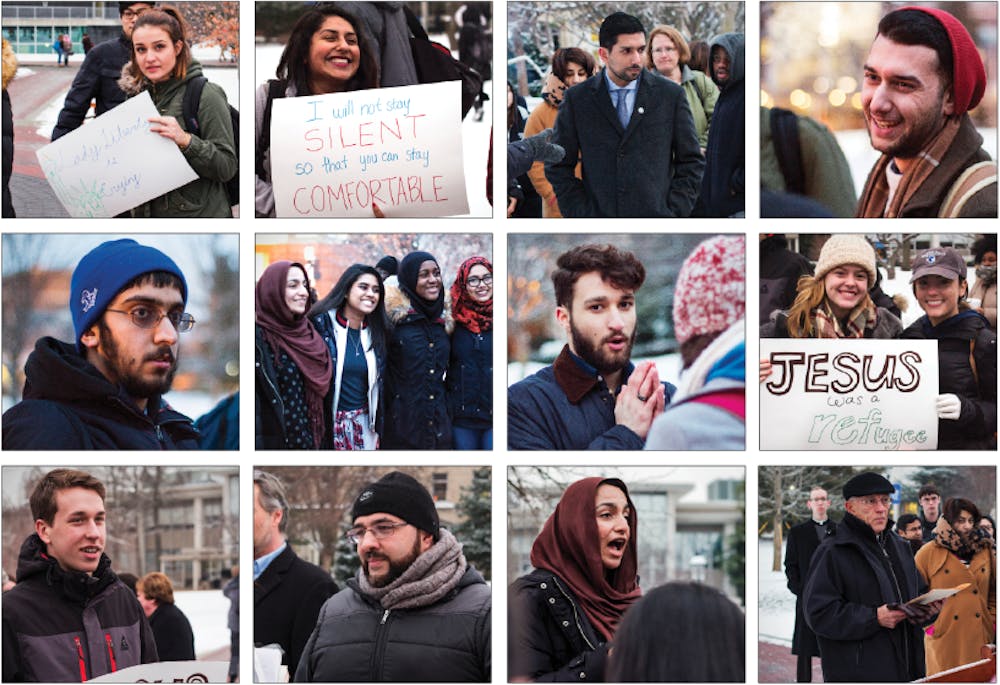The executive order is called “Protecting the Nation from Foreign Terrorist Entry into the United States” and included banning travel from seven Muslim-majority countries for 90 days and suspending all refugee admissions for 120 days. The countries directly affected by the travel ban are Iraq, Syria, Sudan, Iran, Somalia, Libya and Yemen.

The order has spurred much controversy, led to dismissal of the acting Attorney General, Sally Yates, caused individuals to gather in airports to protest, and has left many Americans considering what this means for the country and who they are as a people.
Adrian Orozco, a sophomore political science major, said via email that he came to the United States when he was four years old. He was living in war-stricken Colombia at the time. He said his family was desperate.
“We were fleeing from an armed conflict and lived here as undocumented immigrants for a year while we prepared ourselves to apply for the political asylum process in immigration courts,” Orozco said.
Orozco said there was constant fighting and warfare going on around him. Violence was an imminent threat. He said what his family went through is strikingly similar to what refugees are going through today.
“When I heard about this executive order I felt frustrated at how others wrongfully perceive immigrants, including refugees,” Orozco said. “Refugees, whose shoes I was in 15 years ago.”
This past Tuesday, President Dr. A. Gabriel Esteban released a statement to the University about the executive order, encouraging anyone affected to reach out to the Office of International Programs and the Office of the Provost for further direction.
“We remain steadfast in our commitment to create an inclusive and welcoming campus environment that embraces people of all faiths and cultures,” read the statement. “During these uncertain times, let us pray for perseverance.”
In an email interview with Esteban, he said that if a student is affected by the executive order then they should contact the offices he mentioned in his statement to the University. Members of the community can also reach out to Counseling and Psychological Services and Campus Ministry for support, Esteban said.
“Patience and perseverance,” Esteban added. “It may be difficult but focus on why you are here. Remember that you are a part of the Seton Hall community.”
Esteban also discussed the founding of SHU, said since it first opened it has been a University of opportunity for its students. This includes first-generation students, immigrants and students of different faiths and beliefs.
He also said that as a community SHU has benefited from recruiting the best students, faculty and staff from across the world. “At Seton Hall, we welcome students from over 60 countries. We welcome them and the gifts they bring that enrich the learning environment.”
While on Seton Hall’s campus this past Monday for an unrelated event, Sen. Bob Menendez also spoke out against the executive order. “This is not, at the end of the day, making the nation more secure. This nation was founded by those seeking refuge in terms of religious freedom,” Menendez said. He promised to push back against this in the Senate.
This executive order has students like Orozco concerned about what this means for all facets of immigration moving forward. In a previous article published in The Setonian, an undocumented student on Seton Hall’s campus was asked about her future as a DACA (Deferred Action for Childhood Arrivals) student. The student, who had asked not to be named, simply said, “I’m totally afraid.”
President Trump has promised to “immediately terminate” former President Barack Obama’s executive actions on immigration, including DACA. There have been no official statements on the DACA program since Trump’s inauguration, but after the executive order last week, students and administration are not sure what the future holds.
Last month, Esteban joined hundreds of colleges and universities that seek to protect unauthorized immigrants by supporting the continuation of DACA. When asked in a previous interview with The Setonian for his reasoning to support DACA, he reflected on his own experience as an immigrant.
“I understand the transformative power of American higher education,” Esteban said. “Jesus Christ told His followers that people on the move – refugees, migrants, immigrants – are special in the eyes of God and should be welcomed.”
However, many are referring to the future as “uncertain” and some students said they are not sure if releasing statements is enough anymore.
Orozco said he wants to see actual steps in place from the administration moving forward. “It’s safe to say the majority of students here support these (immigrant) students, but the administration itself has to make a greater effort,” Orozco said.
Orozco spent last summer interning at the Legal Immigration Center of the Catholic Charities of the Archdiocese of Newark and is a self-proclaimed activist for this cause. “I’d like to let DACA students and immigrants know that there are a lot of people on their side,” Orozco said. “An attack on them won’t be uncontested.”
Divine Tanamal, a freshman business marketing major, emigrated from the Philippines to America when she was four. She said in an email interview that coming to America was a sign of success, but seeing this situation unfold is very troubling.
“This is all very frustrating to witness,” Tanamal said. “I just hope that (it) is enough for people to get into political discussions, organize, and fight for their rights. We did not come here to be persecuted; in fact, most of us are running away from experiencing just that.”
Editor’s note: Gary Phillips also contributed to this report.
Siobhan McGirl can be reached at siobhan.mcgirl@student.shu.edu.





